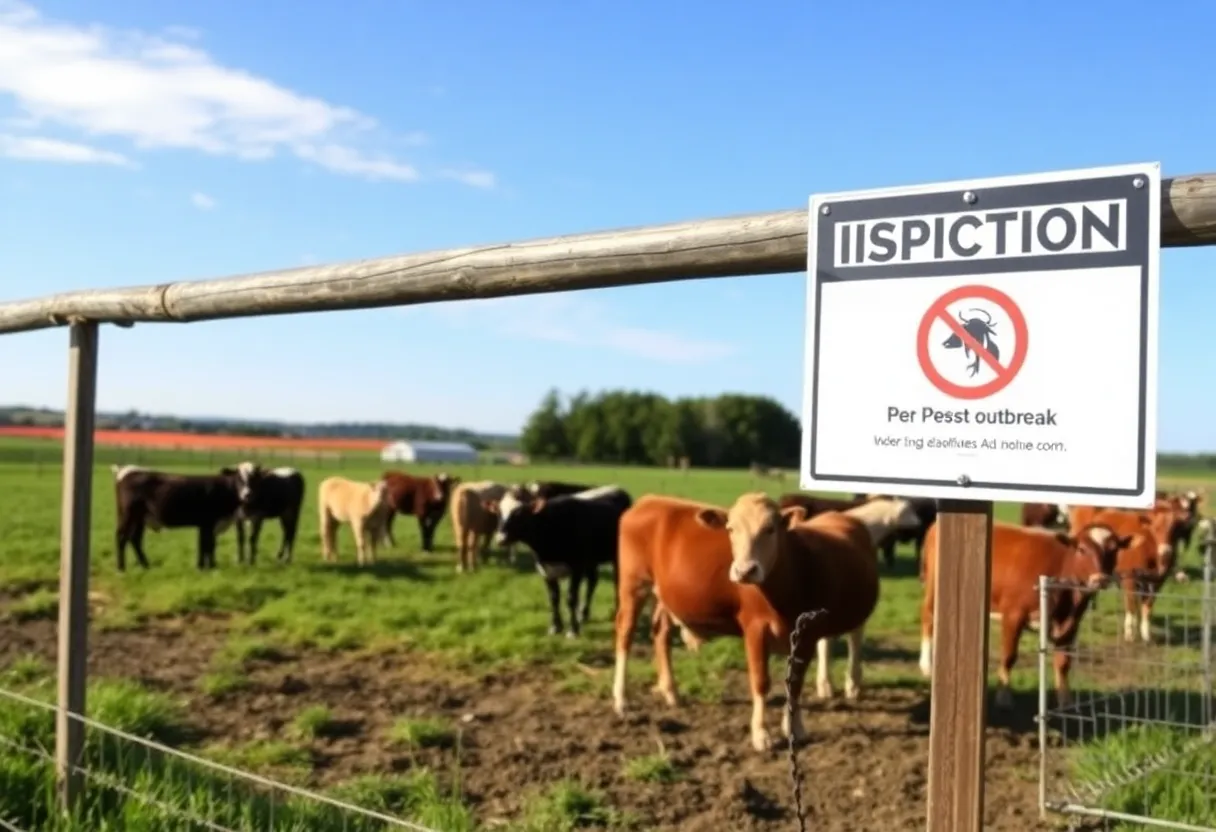News Summary
In response to the New World Screwworm outbreak in Mexico, the USDA has temporarily halted the importation of live cattle, horses, and bison from the southern border. This parasitic fly poses a significant threat to U.S. livestock, leading to severe animal health issues. The USDA, in collaboration with Customs and Border Protection, is actively monitoring the situation to ensure the safety of American livestock and mitigate any potential spread of this pest. This action underscores the importance of animal safety as a national security concern.
USDA Hits Pause on Imports of Cattle, Horses, and Bison Amid New World Screwworm Scare
In a recent move to safeguard U.S. livestock, the USDA has announced a temporary suspension of all live cattle, horse, and bison imports crossing through southern border entries. This decision comes in response to the alarming spread of the New World Screwworm (NWS) in Mexico, a situation that’s raising eyebrows and concerns.
What Is the New World Screwworm?
For those unfamiliar with this pesky critter, the New World Screwworm is a parasitic fly that has been wreaking havoc since its first detection in Mexico back in November 2024. Once the larvae hatch, they can burrow into the flesh of living animals, leading to severe damage and, unfortunately, even death in affected livestock. What makes this situation particularly concerning is that NWS can infest not only livestock but also pets, wildlife, and in rare instances, humans and birds.
The Spread of NWS
Recently, the presence of NWS has been confirmed in various remote farms across Mexico, stretching as far north as Oaxaca and Veracruz, which is a whole 700 miles from the U.S. border. This rapid spread has prompted both Mexico and the United States to step up their collaborative efforts in mitigating the outbreak of this dangerous pest.
How Is the USDA Responding?
The USDA’s Animal Plant Health Inspection Service (APHIS) is closely working with Customs and Border Protection (CBP) to enforce the suspension on live animal imports from Mexico. The entire situation is being closely monitored and will be subject to review on a month-to-month basis until significant progress in containment is made. The ultimate aim? To ensure that U.S. livestock remains safe from this troubling pest.
A Matter of National Security
The USDA views this situation not just as a health scare for animals but as a national security issue regarding food and animal safety. It’s a serious matter that could impact food supplies and the economy if left unchecked.
Ongoing Efforts
Both countries are stepping up their game in terms of surveillance and eradication initiatives. This includes conducting field surveillance and implementing educational outreach programs to keep everyone informed. The goal is to prevent and detect NWS early while controlling the movement of animals to restrict any potential spread.
Previous Eradication Efforts
Looking back, the USDA has already dealt with NWS successfully before, but it didn’t come easy. Their previous eradication efforts took decades and proved to be quite costly. In fact, in 2010 alone, beef imports from Mexico hit a whopping 107 million pounds, marking Mexico as the fifth largest beef exporter to the U.S. Who could forget those numbers?
The Road Ahead
For now, while the suspension may seem to put a halt to the vibrant trading of live cattle and horses, the USDA is committed to ensuring that their livestock is protected. They are working tirelessly with Mexican officials to combat NWS, hoping for a future where the U.S. can safely reopen its borders to livestock trade.
So, we will all have to keep our ears to the ground as the situation unfolds. While the road to eradication and safety may be long, the efforts being put forth aim to ensure that U.S. livestock remains safe and sound.
Deeper Dive: News & Info About This Topic
- KSHB: USDA Suspends Live Animal Imports
- Wikipedia: New World Screwworm
- Fox Weather: New World Screwworm Alert
- Google Search: New World Screwworm
- Michigan Farm News: Rollins to Mexico
- Encyclopedia Britannica: Parasite
- Fox 4 KC: Texas Warns of Parasitic Worms
- Google News: New World Screwworm

Author: STAFF HERE WILLIAMSBURG WRITER
The WILLIAMSBURG STAFF WRITER represents the experienced team at HEREWilliamsburg.com, your go-to source for actionable local news and information in Williamsburg, James City County, and beyond. Specializing in "news you can use," we cover essential topics like product reviews for personal and business needs, local business directories, politics, real estate trends, neighborhood insights, and state news affecting the area—with deep expertise drawn from years of dedicated reporting and strong community input, including local press releases and business updates. We deliver top reporting on high-value events such as Williamsburg Farmers Market, Yorktown Market Days, and Busch Gardens Food & Wine Festival. Our coverage extends to key organizations like the Greater Williamsburg Chamber of Commerce and Colonial Williamsburg Foundation, plus leading businesses in education and hospitality that power the local economy such as College of William & Mary, The Williamsburg Winery, and Sodexo. As part of the broader HERE network, including HEREVirginiaBeach.com, we provide comprehensive, credible insights into Virginia's dynamic landscape.


